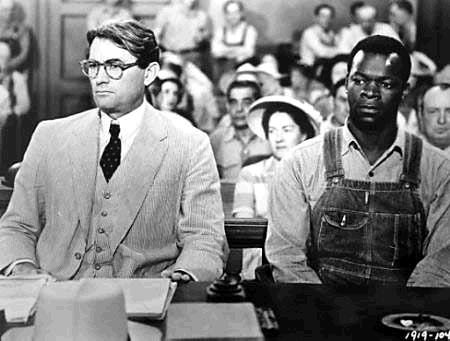 |
| To Kill a Mockingbird: Atticus Finch and Tom Robinson |
The Sixth Amendment of the United States Constitution grants
criminal defendants the right to counsel in federal cases. In 1963 the Supreme Court extended this right
to state felony prosecutions in the landmark case Gideon v. Wainwright. Twenty-one years after Gideon, the Supreme Court in Strickland v. Washington held that the right to counsel really means the right to effective assistance of counsel. Generally speaking, ineffective assistance of counsel (IAC) can be defined as errors by counsel so severe in nature that the criminal
defendant was denied a fair trial. Strickland
provides a specific test. Under Strickland, a defendant must establish:
(1) their trial lawyer’s performance fell short of an “objective standard of
reasonableness” and (2) “a reasonable probability that, but for counsel’s
unprofessional errors, the result of the proceeding would have been different.”
The right to effective assistance of counsel obviously is
important for criminal practitioners and for law students who wish to enter the
field. This post will provide three
instances in which IAC claims are commonly brought, as well as analysis and
advice on what does and does not constitute IAC in those situations. The three instances are: inexperience of
counsel; counsel’s failure to search for mitigating evidence in penalty phases
of murder trials; and counsel’s failure to object to the requirement that the defendant wear restraints in front of the jury.
In U.S. v. Bergman,
a recent Tenth Circuit case, Gwen Bergman pled guilty to violating federal law
after she paid $30,000 to a undercover law enforcement agent posing as a hit
man to murder her ex-husband. Bergman, though, later discovered her counsel
had never been a licensed attorney. The Tenth Circuit held that it was per se
IAC when a “man claiming to have been successfully admitted to the bar, but who
never attended law school or even graduated from college” and was a convicted
felon represented a criminal defendant. However, nervous, fledgling lawyers should
not be worried: The Seventh Circuit (albeit before Strickland) has held that the “mere inexperience of trial counsel”
does not by itself establish IAC.[1] Referencing
Shakespeare, the court noted “Portia without experience was a remarkably successful
representative of Antonio” to make the point that the lawyer’s actions, not
experience, determine the effectiveness of their counsel.[2]
While this is a somewhat lighthearted example, it is important to note that IAC claims
commonly arise after a defendant has been convicted of and sentenced for
murder. Often, the issue is whether counsel performed a reasonable
investigation into mitigating evidence for a defendant’s penalty phase of his
or her murder trial.[3] For example, in Wiggins v. Smith, the Supreme Court held that defense counsel’s
decision to limit the investigation looking for mitigating evidence to the
presentence investigation reports and social services records fell short of prevailing
standards in capital cases and thus constituted IAC.
In contrast, counsel’s decision in Strickland to not seek out character
witnesses or request a psychiatric evaluation was not IAC. One of the lessons from these cases is that a
Strickland analysis is very
fact-specific: in Strickland the
murders were especially brutal, less mitigating evidence was available, and the
defendant acted against counsel’s advice by confessing to two murders and
waiving his right to a jury trial, making his situation “hopeless”; in Wiggins, on the other hand, “[t]he mitigating evidence counsel
failed to discover and present [was] powerful” as the defendant had an
“excruciating life history” which counsel failed to explore and introduce.
IAC claims also can arise when a defendant is convicted of
murder after a trial in which he or she was wearing restraints in front of the
jury. In a recent Alabama federal
district case, Geoffrey Todd West, found guilty at trial of capital murder
during the course of a robbery, brought several IAC claims against his
attorneys, including their failure to object to the requirement he wear a stun belt during trial.[4] Despite
acknowledging that appearing before a jury in restraints can be highly
prejudicial to a defendant, the court found no IAC because the attorney’s failure
to object was actually a conscious, strategic decision and thus fell within the
language of Strickland that encouraged
lower courts to be highly deferential to strategies of counsel.[5]
In conclusion, it is important to know about IAC claims as
they can lead to sanctions and maybe even civil suits for malpractice, as well
as harm to the lawyer’s reputation and career. More important than this, though, is the
welfare of the client, especially in capital cases. Accordingly, this post is not meant to show
current and future practitioners what the minimum standard of effective counsel
is, but instead to inform them what is expected and required of criminal attorneys
to help ensure defendants receive competent and thorough representation.
The most important takeaway from Strickland, then, is that “strategic choices made after thorough investigation of law and facts relevant to plausible options are virtually unchallengeable.” Although
this goes beyond the barebones requirements of Strickland, strategic decisions based on a thorough investigation
will lead to effective representation while protecting attorneys from IAC
claims.
James K. Howard
Senior Editor, Criminal Law Practitioner
Image by Moni3 [Public domain], via Wikimedia Commons.
[1] U.S. ex
rel. Williams v. Twomey, 510 F.2d 634, 638-39 (7th Cir. 1975).
[2] Id. at 639.
[3] See, e.g., Wiggins v. Smith, 539 U.S.
510 (2003); Strickland v. Washington, 466 U.S. 668 (1984).
[4] West v.
Allen, 868 F.Supp. 1224, 1240, 1255 (N.D. Ala. 2011).
[5] See id. at 1253 (citing Strickland, 466 U.S. at 689).

Nice blog. Please keep updating.Walker Law Group is a boutique law firm offering a range of legal services including compensation, workers compensation, motor vehicle accident compensation, personal injury compensation, slip & fall compensation and public transport injury compensation.
ReplyDeletePersonal Injury Compensation Lawyers Sydney